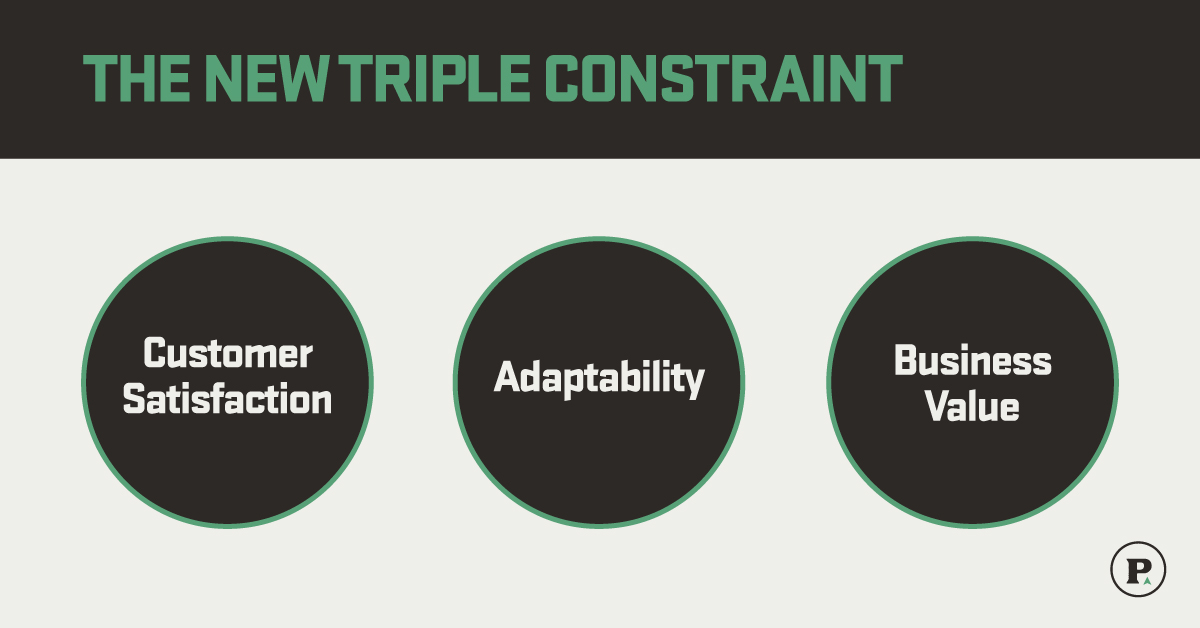The tides are turning for PMOs. As discussed in our previous post, tracking timelines and budgets no longer cuts it in today's landscape. To stay relevant, PMOs must transform into strategic powerhouses delivering real business value.
In this blog, we'll map the route for PMOs to evolve from rigid enforcers to adaptable, value-driven partners. By adopting a future-ready mindset focused on enablement over enforcement, PMOs can align with organizational goals and gain a competitive edge.
We'll highlight the traits that set leading PMOs apart—like championing agile workflows that quickly adapt, leveraging data to inform strategic decisions, and transitioning from oversight to empowerment. Read on to learn how to guide your PMO confidently into the future!
Upgrading the Triple Constraint

The project management triple constraint needs an upgrade. Time, cost, and scope are table stakes these days. Leading organizations now prize a more strategic “new triple constraint” focused on the bigger picture.
This modern framework assesses success across three key dimensions:
- Customer Satisfaction – Delighting users with exceptional experiences
- Business Value – Driving outcomes tied to organizational objectives
- Adaptability – Remaining flexible as needs evolve
By aligning projects using this upgraded set of metrics, PMOs can significantly boost strategic impact. They can deliver meaningful results, not just checked boxes.
To make this shift, PMOs must refine their Key Performance Indicators (KPIs) to reflect the new triple constraint. This will cement their role in driving long-term success, not just short-term execution.
Incorporating Outside-In Inputs
Traditional reporting no longer cuts it for PMOs seeking strategic impact. To evolve, they must incorporate inputs beyond internal data for a multi-dimensional view.
This means directly capturing customer feedback, not just relying on hearsay. It means concretely measuring business value, like revenue and cost savings. It means baking agility into systems to quickly adapt.
These outside-in inputs provide true visibility into what matters most—the real customer experience and tangible business outcomes. With sophisticated inputs, PMOs can pivot from narrow governance to strategic enablement.
Becoming Inherently Adaptive

Change is accelerating. To keep pace, PMOs must make agility intrinsic to their DNA. Adaptability can't just be an occasional pivot — it must be ingrained into everyday operations.
Leading PMOs architect flexible systems to swiftly respond to shifts in business needs, technologies, and customer expectations. They cultivate a sixth sense for change, proactively jumping into action ahead of the curve. This deeply embedded agility is crucial to guide organizations through unpredictable waters.
Transitioning to Continuous Value
Mere governance is no longer enough. PMOs must embrace agile methodologies and focus continuously on delivering value. But adapting processes is only half the battle.
The mindset must also transition from project-centric to product-centric, aligning more closely with business objectives and customer needs. This wider perspective empowers PMOs to concentrate less on milestones and more on overarching value outcomes beyond delivery.
Embracing Outcome Accountability
Rigid governance is losing relevance. A new standard is emerging — outcome accountability. Future PMOs will be judged on delivering tangible business value, not adhering to restrictive processes.
This shift focuses on enablement over protocols. Rather than obsessing over details, PMOs should empower teams while maintaining alignment. They must provide flexible frameworks and then get out of the way.
PMOs that exchange stifling governance for accountable autonomy will thrive. They'll go from enforcing rules to enabling results, unlocking tremendous potential. Excellence now means cultivating bottom-line impact, not perfect order.
Becoming People Smart
As digital transformation accelerates, distinctively human strengths like creativity and emotional intelligence become key differentiators.
Forward-thinking PMOs will cultivate these “people” skills despite increasing tech reliance. Rather than just deploying tools, they must empower teams with soft skills.
This means emphasizing collaboration, inclusion, and transparency. It also entails fostering agile mindsets that drive change.
PMOs that blend analytical and creative skills with emotional intelligence will thrive. They'll motivate, connect, and provide vision, merging project management science with leadership arts. In short, they'll be “people-smart.”
The PMO Revolution
The PMO of the future is not just an upgrade but a transformation. As we enter this new era together, PMOs must change from governance administrators to strategic impact drivers.
The time for gradual change is over — transformation must happen now. PMOs must shift from focusing on projects to enabling products and outcomes.
The final blog in our PMO series will give you the blueprint for turning your PMO into a future-ready powerhouse, equipped to thrive in tomorrow’s landscape.